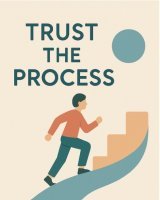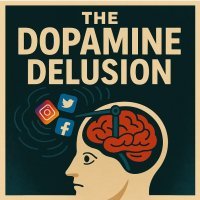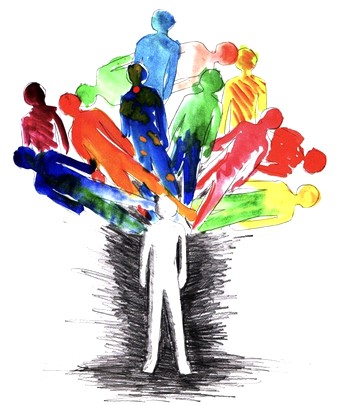Self Dialogue
Working With Your Many Selves
Introducing Self Dialogue
The key to effective self dialogue is to have tools, techniques and resources that work with all levels of your mind.
This simple self-facilitated technique that I am going to share with you here will enable you to do two things:
- To access your unconscious and "hard to reach" parts to enable you to break and change habits and to overcome your inner resistance to personal change.
- To access, experience and communicate directly with your higher or
transcendent self to give you the power to actually follow through and make these changes and have them stick.
The Many Selves
When you refer to "myself" you are not referring to one singular entity but a very complex amalgam of many different aspects of your self sometimes referred to as the internal family of selves -also known as "sub-personalities".
Your selves are often in conflict with reach other, and this is the underlying reason why you can’t keep your New Year’s Resolutions, and why you are largely immune or resistant to personal change.
This is why the so-called "self help" industry is so large and why so many of us spend so much money and time on all this but generally don’t change.
The Background To Self Dialogue
The term Self Dialogue can be used in a general sense to describe an internal conversation within yourself between different elements or perspectives within your mind.
The process that I use, and that I refer to as Self Dialogue, is adapted from Voice Dialogue, a Jungian therapeutic technique
developed by Drs Hal and Sidra Stone, and the Big Mind process developed by US Zen Master Genpo Roshi to integrate the insights and processes of Voice Dialogue with the Zen
tradition.
From a therapeutic perspective the Stones came to see that an over-identification with some selves and rejection of other selves creates imbalances that are often reflected in our resistance to certain situations and certain people and especially to change.
Having worked with the Stones over a number of years, Genpo Roshi came to realise that their process of accessing and giving voice to the selves (especially the denied or disowned selves) could be adapted to allow non Zen practitioners access to transcendent states and to do so more on less on demand.
Disclaimer: I am not a therapist nor am I a counselor or trained in anyway to offer training or advice on these or any related therapies or techniques. This article is a sharing of my understanding and experiences for your interest only.
Controlling Self Observing Self Aware-Facilitator Self Higher Self Opposite Selves There two key points here: [1] There are multiple selves - literally hundreds or thousands of selves, probably unlimited selves. [2] For each and every self there is an opposite self. Do not over think any of this. Treat your selves as real people not inanimate objects. Facilitator Self is going to run this process Facilitator Self asks each self that wants to speak the following questions: [1] How I reduced extreme stress using the Self Dialogue process
About 10 years ago I went through a very difficult time. I was
experiencing a lot of uncertainty, stress and confusion in my life related to
some business and financial issues. Here is how I applied the Self Dialogue process:
[Side note – asking the ego’s permission and then giving it a task to
do works well as it basically gets the ego out of the way.]
[Side note – this only process works when we just go for it – just do
it – with no conscious thinking about it – we just go with whatever
comes up and say it without any filtering, analysis or internal
commentary. When we speak as that voice – we (temporarily) become that
voice.]
[2] How I instantly stopped smoking using the Self Dialogue process
[Side note – for every self there is always an opposite self.]
[Side note – this is important – we never seek to deny or suppress a
negative or "unhelpful" self we simply "power up" it’s positive opposite
self. So in this case I will always have a smoking self and an addicted
self but they are now far less powerful than my non-smoking self.]
Further Reading: Return from "Self Dialogue" to: Walking The TalkSelf Dialogue - The Key Players
Self Dialogue - The Rules Of Engagement

Facilitator Self is running this process exactly as it would if it was dealing with a group of physical people enacting these roles.
Self Dialogue In Practice

Next Article: The Transformative Power of Acceptance
LATEST ARTICLES
The Battle For Your Mind - How To Win Inner Freedom In A Digital Age Of Distraction
 From External Events to Inner Events. We often think of “events” as things that happen out there: the traffic jam, the rude comment, the delayed email reply. But what truly shapes our experience is wh…
From External Events to Inner Events. We often think of “events” as things that happen out there: the traffic jam, the rude comment, the delayed email reply. But what truly shapes our experience is wh…How to See Your Thoughts Without Becoming the Story
 A Practical Guide to Thought-Awareness. You can spend your life inside the stories of your mind without ever learning how to see your thoughts clearly and objectively. Most of the stuff we tell oursel…
A Practical Guide to Thought-Awareness. You can spend your life inside the stories of your mind without ever learning how to see your thoughts clearly and objectively. Most of the stuff we tell oursel…The Collison Decision Matrix - A Simple Framework for Better Choices
 The Collison Decision Matrix Is A Practical Everyday Thinking Tool. Most of us spend a surprising amount of time worrying about decisions. From small ones such as what to wear, what to eat, what to te…
The Collison Decision Matrix Is A Practical Everyday Thinking Tool. Most of us spend a surprising amount of time worrying about decisions. From small ones such as what to wear, what to eat, what to te…The Power Of Asking The Right Question
 The Power Of Asking The Right Question Lies In The Quest For Insight. To experience the power of asking the right question you must develop the practice of asking questions. The best way to improve th…
The Power Of Asking The Right Question Lies In The Quest For Insight. To experience the power of asking the right question you must develop the practice of asking questions. The best way to improve th…Site Pathways
 Here is a site pathway to help new readers of Zen-Tools navigate the material on this site. Each pathway is based around one of the many key themes covered on this site and contain a 150 word introduc…
Here is a site pathway to help new readers of Zen-Tools navigate the material on this site. Each pathway is based around one of the many key themes covered on this site and contain a 150 word introduc…How To Live With Contradiction - Beyond Thought Let Stillness Speak
 A major impact on so many peoples' lives is the situational contradiction of unfilled realistic expectations. So where does all this leave us? Well here we are, with mental equipment that is more lim…
A major impact on so many peoples' lives is the situational contradiction of unfilled realistic expectations. So where does all this leave us? Well here we are, with mental equipment that is more lim…How To Trust The Process Of Mindfulness - Right Now
 In mindfulness, the process isn’t some distant goal — it's what is happening right now. When we talk about how to trust the process of mindfulness the credibility of the process is heavily dependent…
In mindfulness, the process isn’t some distant goal — it's what is happening right now. When we talk about how to trust the process of mindfulness the credibility of the process is heavily dependent…Inner Mastery For Outer Impact - Mental Clarity For Effective Action
 Insights only matter if they translate into consistent action. In a world crowded with quick fixes and motivational soundbites, the theme “Inner Mastery for Outer Impact” calls us to something more e…
Insights only matter if they translate into consistent action. In a world crowded with quick fixes and motivational soundbites, the theme “Inner Mastery for Outer Impact” calls us to something more e…The Wise Advocate - Helping You Achieve The Very Best Outcome
 The focus of your attention in critical moments of choice either builds or restricts your capacity for achieving the best outcome. When we talk of 'The Wise Advocate' its easy to think of the consigl…
The focus of your attention in critical moments of choice either builds or restricts your capacity for achieving the best outcome. When we talk of 'The Wise Advocate' its easy to think of the consigl…Trust The Process - Beyond The Cliche
 The phrase "trust the process" has become a cliche, the woo-woo mantra of the "self help" industry. Those three little words feel like they ought to mean something useful but hidden behind them are a…
The phrase "trust the process" has become a cliche, the woo-woo mantra of the "self help" industry. Those three little words feel like they ought to mean something useful but hidden behind them are a…The Dopamine Delusion - Why Anticipation Beats Achievement
 The thrill we feel is not in the having, but in the wanting. The more we have, the more we want. The more things we acquire and the easier things get for us, the more discontent we feel. The more spo…
The thrill we feel is not in the having, but in the wanting. The more we have, the more we want. The more things we acquire and the easier things get for us, the more discontent we feel. The more spo…The Power Of Silence Is Experienced In Your Use Of Language
 Practise the "Beneficial Neurological Delay" for optimal comprehension. The power of silence is experienced in your use of language, specifically: - How you formulate the words you use to think and in…
Practise the "Beneficial Neurological Delay" for optimal comprehension. The power of silence is experienced in your use of language, specifically: - How you formulate the words you use to think and in…


